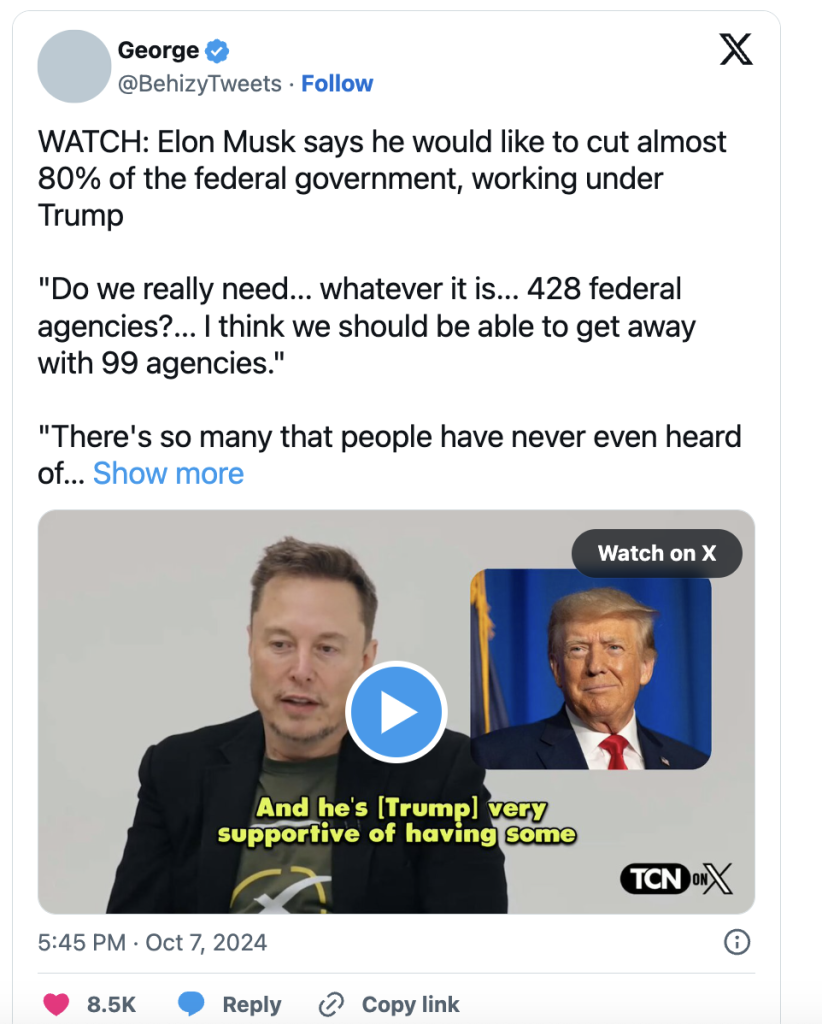Elon Musk presented a radical plan for reorganizing the federal government in a recent conversation with Tucker Carlson. His plan to eliminate about 80% of federal agencies struck a chord with a large number of people who were tired of the Democratic-led White House’s inefficiency.
Would 428 federal agencies really be necessary? Musk argued in favor of a simplified governance structure, saying, “I think we should be able to get away with 99 agencies.”
A serious worry about government inefficiencies and redundancies is brought to light by Musk’s statement. He stressed how many federal agencies have overlapping duties, which adds to an overburdened bureaucracy that is unable to provide good services to the American people. His time at X, now Twitter, is a shining example of how major cost reductions may improve functionality.
“We reduced headcount by 80%, yet operations became more efficient,” he said, implying that the federal government may benefit from a similar strategy.
This viewpoint is in line with a suggestion put up by the previous president of the United States, Donald Trump, who proposed the creation of a “Efficiency Commission” led by Musk. Trump stressed the necessity of a federal government audit during a speech to the Economic Club of New York. He stressed the need of eliminating waste and inefficiencies by saying, “This commission will conduct a complete financial and performance audit of the entire federal government.”

Congress is believed to be unable to control government waste, which has led to growing discontent with the idea of an Efficiency Commission.
This program, according to Veronique de Rugy, might intervene while “our delinquent legislators are asleep on the job.” The commission’s goal is to hold a system accountable that frequently appears detached from the problems that regular Americans experience.
There are some differences between how Musk and Trump define efficiency. Musk has more in mind than just decreasing funds, even though they both agree that waste must be reduced. He contends that the operations of the private sector shouldn’t be supported by a simplified government, as this would improve the distribution of resources.
Because local governments may become less answerable to their voters, reliance on federal assistance may set off a vicious cycle of reckless policymaking. These funding schemes have the potential to misspend funds and erode democratic governance, which would put a greater burden on taxpayers in the long run.
Before the commission’s first six months of operation, Trump has pledged to implement a rapid action plan that will end fraud and inappropriate payments. Trillions of dollars will be saved, he claimed. Yet, a number of analysts have expressed doubt about this assertion, questioning if the budget can actually be balanced by eliminating fraud alone.
Government statistics indicate that inappropriate payments totaling over $236 billion were paid by agencies during the most recent fiscal year, underscoring the need for reform. The magnitude of the issue is highlighted by the fact that since 2003, the total amount of unlawful payments has increased to an astounding $2.7 trillion. It is concerning to note that a significant portion of these erroneous payments are attributable to a select few large federal programs.
The magnitude of these inefficiencies makes Musk’s lead-led Efficiency Commission seem highly plausible. There is a chance that the way the federal government functions will alter significantly now that both Trump and Musk are supporting major reforms. When they work together, a system weighed down by red tape can become more accountable and efficient.
By concentrating on cutting waste and fraud, the proposed commission may establish a government that puts the needs of its people first.
The cooperation between Trump and Musk represents a change in the conservative perspective on government reform. Their goal is to redefine effective service to the American people by taking on the problem of inefficiency head-on. The possible results of this project might establish new standards for public accountability.
Musk’s plans have ramifications that should be closely examined as the debate over government efficiency proceeds. Should this program be successful, it has the potential to not only save taxpayer money but also rebuild trust in the federal government’s capacity for transparent and efficient operations.



